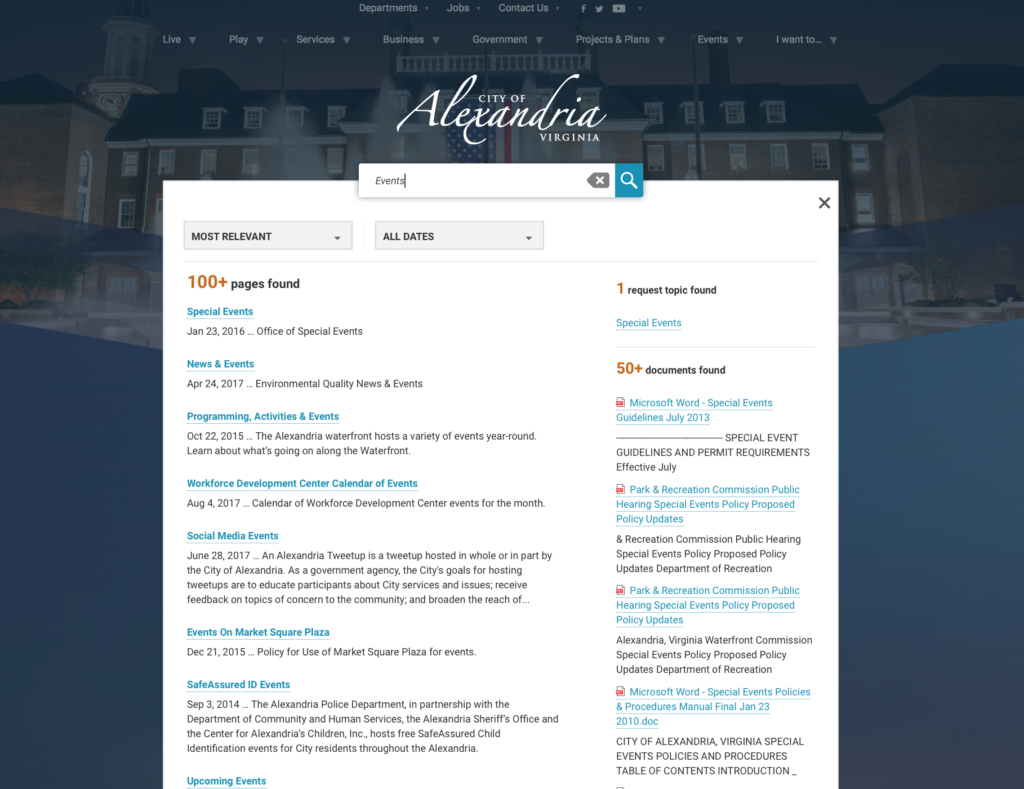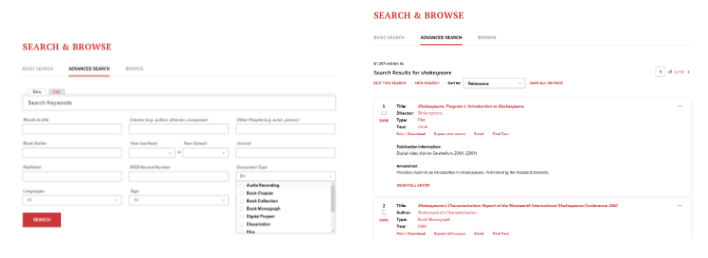How to Integrate Search Platforms with Content Management Systems

Integrating custom search platforms into your WordPress or Drupal-powered website can equip your content management system (CMS) with the ability to index and search content through custom, faceted results as a powerful solution. We break down five of the most popular search platform options by complexity, level of control, quality, and cost to help you choose the ideal search integration for your business goals.
Why should you use a search platform like Solr or Swiftype? There are several factors that can determine the need to implement enterprise search, including customizing or altering current search results. For performance issues, platforms like Swiftype and Solr offload computation to increase the perceived performance of your server while offering powerful solutions like autocomplete and other dynamic facets.
Built-in WordPress and Drupal Search
WordPress and Drupal are highly customizable and easily manageable open source content management systems. Combined, they power more than 64% of CMS’. However, the built-in search on both lacks a number of advanced features which limit its effectiveness as a search platform in comparison to other services.
Implementation: Easy
- WordPress comes with a default, built-in search, as does Drupal. It is functional and extremely simple in terms of install and management, given that it is already built into the CMS.
Control: None
- Because it is built into the CMS, there is no administration interface for altering results. Filtering based on relationships often requires custom queries, and relevancy-based sorting is nearly impossible.
Quality: Poor
- These both lack several key features available in other search platforms, such as having no relevancy sort and not being able to search outside of post content. We do not usually recommend built-in WordPress or Drupal search for this reason, as it is essentially a deficient search experience.
Cost: Free
- As the search platform is already built-in, the administrator does not pay for any portion of the service. It is therefore the most cost-effective option.
Swiftype
Swiftype offers a higher level of complexity with good control and an account representative. Swiftype is built on an advanced search algorithm that delivers relevant results for complex queries. It also offers the ability to edit search result abstracts to best illustrate internal content and help drive SEO.
Implementation: Moderate
- Swiftype is fairly easy to implement as a search platform. It is user friendly for nontechnical web managers, and offers a clean, slick interface that is easy to manipulate. A built-in crawler gives Swiftype the distinction as being the easiest to get federated search up and running.
Control: Moderate
- There is a fair amount of control available to administrators when using Swiftype that is certainly not afforded in a built-in search. The admin interface can prioritize results for different search terms, meaning the administrator can force something to be the first result. You can also control whether the results are for a singular site or for additional organization websites, including publication sites, microsites, or other multi-sites.
Quality: Good
- Swiftype is of high quality and, most helpfully, ready to use out-of-the box. A simple integration process means you can use it almost immediately, without needing intense configuration.
Cost: Expensive
- Despite a recurring monthly cost, Swiftype can be a cost-effective solution in that it is easy to use and manipulate while offering a fair amount of flexibility for the nontechnical administrator. For non-developers, the time and resources saved for install and management are important factors in calculating overall cost.
Our Work with Swiftype:
Flight Safety Foundation serves over a 1,000 organizations in 150 countries. To help these vastly varied target audiences quickly and efficiently find pertinent information, we implemented Swiftype on their WordPress site and used federated search to present users with multi-site results.
For Learning Without Tears, we coalesced three different company entities into a single, comprehensive site. With a larger body of content, WDG developers employed Swiftype as a federated search integration that allows users to search resources from multiple properties at once.
Our development team implemented Swiftype for customized search results as part of the City of Alexandria’s recognition campaign for being named “one of the most livable cities in the United States.”
Pantheon Search (Solr) and Acquia Search (Solr)
Both Pantheon Search and Acquia Search are powered by Solr at their core. They are unique wrappers for Solr, offering direct access to Solr in order to leverage a moderate amount of control over the search features.
Implementation: Moderate
- While still relatively easy to manage, the complexity of both Pantheon and Acquia Search is greater than that of Swiftype. The control is entirely at the developer level, meaning any changes must be done by an experienced developer (there is no non-technical way to control the search functions otherwise). However, because these are included in the platform, half the setup is already done. By cutting down on initial setup time and allowing direct access to Solr, the complexity is ultimately moderate for developers.
Control: High
- Developers can alter just about any part of indexed or queried data, but Pantheon and Acquia do restrict direct access to Solr configuration as they are hosted solutions.
Quality: Good (dependent on use)
- The quality of both Pantheon and Acquia Search is quite good, but largely dependent on how you leverage the platform for your specific site needs. Because you have control of the system, the success of the configuration depends on the actions of the developer. Essentially, the quality is what you make of it.
Cost: Included with Subscription
- Any additional costs are nominal because you are already paying for the platform.
Our Work with Pantheon and Acquia:
For our current work with Playworks, we are including Pantheon search to support content relevancy needs on their WordPress multi-site. For the United States Institute of Peace, we integrated Acquia Search on their Drupal-based site designed to pinpoint contextual relevancy and internally customize the indexing and querying of content.
Self-Hosted Solr
Apache Solr is Java-based, open source enterprise search platform built on Apache Lucene that is reliable, scalable, and fault tolerant. Solr is a premier choice in indexing and searching content with easily filterable results, and is the basis for many managed solutions. Self-hosting Solr allows you to directly control results and incorporate as many dynamic facets as you could imagine.
Implementation: High
- The complexity of self-hosted Solr is high, because there is no wrapper designed to make administration non-technical. This means the developer controls setup and configuration of the entire system from the start; however, this constitutes immense control on the development side.
Control: Extremely High
- With Solr, you configure the search platform to your exact specifications, meaning you have access to the Solr boxes yourself. You gain the greatest amount of control possible by using self-hosted Solr, but the resultant quality depends entirely on your custom configurations.
Quality: What You Make of It
- Because you have broad control of integrating Solr, the quality of the search is entirely what you make of it. The ultimate end search functionality depends entirely on how it is configured by the development team.
Cost: Varies from Expensive to Very Expensive
- Solr is open source, meaning it is free, but the server-setup you decide to host it on determines the end cost.
Our work with Solr:
To refine search results for the broad content pool found on the American Enterprise Institute (AEI)’s WordPress website, WDG’s team set up a separate server to work with custom post types, taxonomies, and additional fields in the system. This allows AEI administrators to easily adjust the relevancy of search returns and weight them accordingly.
For Folger Shakespeare Library’s Drupal-powered World Shakespeare Bibliography, we created a customized search implementation and configuration with many filters for data funneling, offering the user powerful and multifaceted browse and search functionalities that could support huge amounts of records while creating an intuitive experience.
Want to find the perfect search solution for your WordPress or Drupal-powered website? Contact our expert web development team or email us at [email protected].









